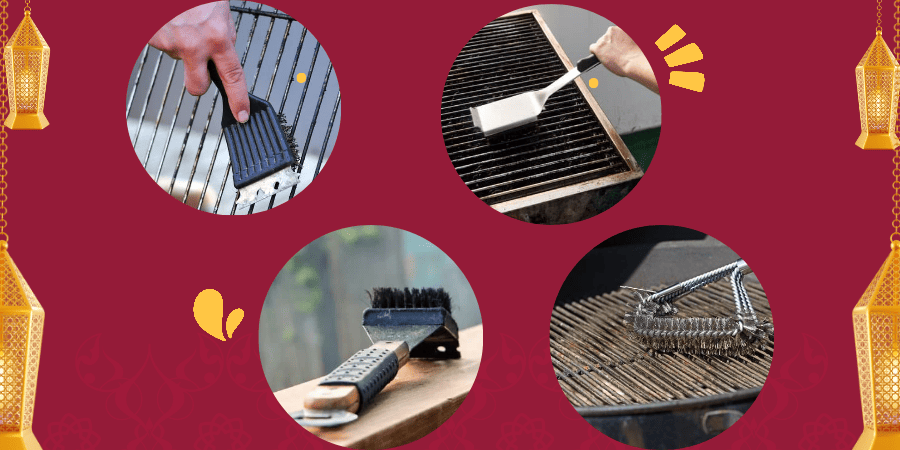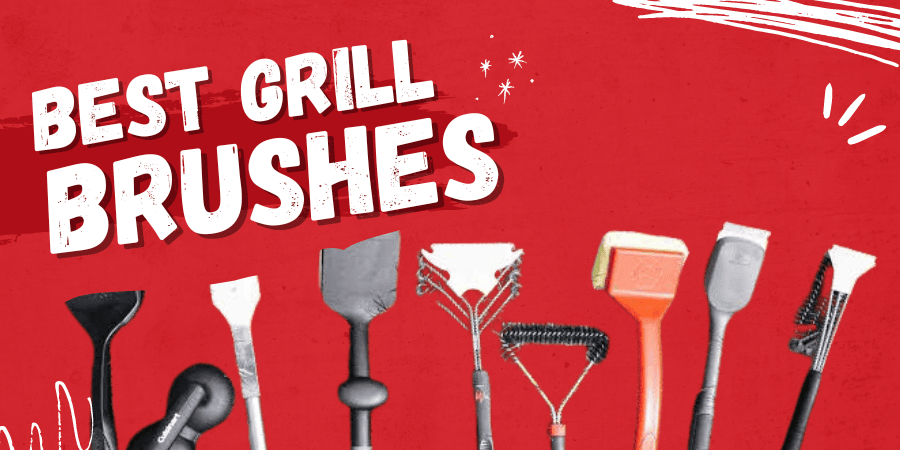Grilling season is upon us, which means it’s time to break out of your trusty grill and get cooking! However, before firing up those coals, you must ensure your grill is properly cleaned and ready to go. The best way to clean your grill is with a sturdy grill brush.
A high-quality grill brush can quickly work out burnt-on grease and food residue, allowing you to get back to grilling your favorite meals in no time. With so many grill brush options on the market, it can take time to determine which is best for your needs.
This detailed guide will lead you through all you need to know to pick the best grill brush for perfect cleaning every time.
Types of Grill Brushes
Grill brushes come in several styles, each with pros and cons. Consider what will work best for your grill and cleaning habits.
Metal Bristle Brushes
Brushes with metal bristles are standard because they’re inexpensive and scrub well. Stainless steel is rust-resistant, while brass bristles are more flexible. The thin bristles can get into grill grooves quickly.
However, metal-bristled brushes have some downsides. The bristles can fall out and get stuck to food, posing a choking hazard. The bristles can also damage porcelain enamel grates over time.
Stainless Steel Pads
Stainless steel pad grill brushes have a flat scrubbing surface instead of bristles. The sturdy pads can tackle the toughest baked-on grime without any risk of loose bristles.
Steel pads don’t work well for cleaning around grill grate edges or thinner grates with wide gaps. The pads are also harder to hold and control than brushes.
Wood/Plastic Bristle Brushes
Wood and plastic bristle grill brushes are gentler for a safer alternative to metal bristles. The bristles still offer abrasive scrubbing power but won’t harm grates. Silicone brush heads are also soft, effective scrubbers.
The bristles are less durable than metal and may need replacing more often. But you avoid the risk of bristles coming loose. Look for brushes with bristles securely fastened to the base.
Chainmail Scrubbers
Interlocking metal rings make an ultra-durable chainmail scrubbing surface. The stainless steel removes stuck-on gunk without any bristles that can break off.
Chainmail conforms to grate grooves and edges well. It takes some extra elbow grease compared to brushes but won’t scratch grates. Over time, the rings may start to separate if used too aggressively.
Electric Grill Brushes
Electric grill brushes take the effort out of scrubbing your grill. Powered brush heads spin to do the hard work for you often with just a single pass.
Cordless battery-powered models provide the freedom to scrub every area. Corded electric brushes offer continuous run times but are less portable. The brushes tend to be pricier than manual options.
Grill Brush Attachments
You can turn an electric drill into a drill-powered grill brush with brush attachments. The spinning brush head works like an electric grill brush to speed up cleaning. Grill brush drill attachments are an affordable alternative to stand-alone electric brushes.

Grill Brush Head Shapes and Sizes
Grill brushes come in various head shapes and sizes for optimal cleaning performance. Here are some of the most common grill brush head configurations:
- Rectangular head: The classic rectangular brush head provides a broad cleaning surface area for efficiently covering large grill grates. Suitable for everyday cleaning.
- Circular head: Circular brush heads allow you to apply focused scrubbing pressure. The compact shape helps clean around burner areas.
- Detail brush: Smaller brushes with angled heads are designed to get into nooks and crannies that large brushes can’t reach. Helpful for cleaning edges and curves.
- Scrub pad brush: Instead of bristles, these have a textured pad for light scrubbing. The pad can be replaced when worn out.
- Motorized brush: Battery-powered rotating brush head spins to do the scrubbing for you. It requires less physical effort to clean the grill.
Larger grilling surfaces and heavier-duty cleaning will benefit from a full-size rectangular grill brush head. But a smaller specialty-shaped brush can be handy for quick touch-ups and detail work. Consider the types of cleaning tasks you’ll use your grill brush for to pick the most practical brush head size and configuration.
Important Grill Brush Features
Beyond just the brush head, there are a few other essential features that contribute to a grill brush being effective and user-friendly:
Bristle Material
As mentioned, the most common grill brush bristles are made from materials like stainless steel, wire, wood, or nylon. Stainless steel and wire offer the most scrubbing power, while wood and nylon are gentler. Look for interlocking bristles that won’t loosen and fall out.
Bristle Length
Longer bristles can reach into grill grooves more efficiently and have better scrubbing power. But too long bristles can be hard to control, making precise scrubbing difficult. Around 2 to 3 inches is optimal.
Comfortable Handle
Cleaning your grill takes some elbow grease, so you want a comfortable brush handle that provides good grip and leverage. Look for non-slip materials and ergonomic shapes that fit nicely in your hand.
Long Handle
A grill brush handle should be 12 inches or longer for convenience and safety. This brush keeps your hand at a safe distance from potential burns. Long handles also provide good leverage for applying pressure.
Replaceable Head
A replaceable brush head allows you to swap out the bristles once they’ve worn down without buying a new brush. It makes the brush last longer.
Hanging Loop
A hanging loop or hole on the handle makes for easy storage and accessibility. You can hang your grill brush on your grill or outdoor kitchen for quick access and organization.

Best Grill Brush Buying Considerations
Finding the perfect grill brush for you involves assessing a few factors:
Bristle material – Choose stainless steel for the most heavy-duty scrubbing power or wood/nylon for a gentle alternative. Bristles should be tightly secured.
Bristle shape – Vector-shaped or crimped bristles retain better than straight bristles.
Comfort grip – Look for an ergonomic handle that allows you to apply pressure while scrubbing quickly.
Safety – Bristle-free or wood/nylon bristle options are safest for avoiding accidental bristle ingestion.
Durability – You’ll get the most value from a grill brush that stands up to frequent high-heat use. Stainless steel and high-quality wood/plastic bristles are more durable than cheap plastic. Chainmail scrubbers also last through years of scrubbing.
Size – Get a grill brush head wide enough to span your grill grates for faster cleaning. Measure between your grates or opt for a brush at least 4 inches wide.
Manual vs. Electric – Electric grill brushes provide powered scrubbing but cost more. Cordless models are the most convenient. Manual brushes are fine for occasional grilling. For frequent grill use, an electric brush can be a worthwhile investment.
Multi-use – Bristled brush heads that clean between grates and cover large areas easily are the most convenient.
Specialty brushes – Smaller brushes are great for detail-cleaning edges, curves, and hard-to-reach spots.
Replaceable heads – Reusing just the brush head extends the life of your grill brush.
Warranty – Quality brushes often come with guarantees or warranties against defects.
Grill Cleaning Tips and Tricks
Armed with your top-notch grill brush, you’ll be ready to take on any mess! Here are some helpful tips for getting a spotless grill surface:
- Clean your grill grates after each use before grime gets too stuck on. Quick regular cleaning is more effortless than deep cleaning.
- For burned-on bits, let the grates soak for 30 minutes after spraying with water or cleaning solution to help loosen residue before scrubbing.
- Use long-handled grill tools and gloves to protect yourself from heat and steam while cleaning a hot grill.
- For wood and charcoal grills, wait for the grill to cool completely before cleaning – wire brushes can damage the seasoning layer on hot grates.
- Spot clean stubborn areas with a grill scraper or ball of aluminum foil after initial brushing.
- Use detail brushes and pipe cleaners to remove gunk and grease from small grill grates and burner holes.
- Avoid knocking loose bristles into the grill – check your brush head regularly for wear. Replace when bristles are bent or falling out.
- Store your grill brush indoors when not in use to prevent bristle corrosion and rusting.
Get ready to fire up your grill with perfectly clean grates using your new favorite grill brush!
FAQ About Grill Brushes
1. Are grill brushes bad for my grill?
Most quality grill brushes are designed to gently yet effectively clean grill grates without causing damage. Wire bristle brushes can damage certain delicate or ceramic grill surfaces over time, so be cautious with those. Chainmail and nylon/wood bristle brushes are gentle on all grill types.
2. How often should I replace my grill brush?
Inspect your grill brush before each use and replace it once the bristles break down, get bent out of shape, or fall out. This brush is usually after about 25-50 uses. Replace just the head if your brush has that feature.
3. How do I clean my grill brush?
Use a grill scraper or another brush to remove residue stuck between the bristles. You can also immerse the brush head in warm, soapy water for 10 minutes. Rinse well and let air dry completely before the subsequent use. Do not soak wood handles.
4. Is a grill pad better than a grill brush?
Grill pads may be slightly gentler than bristle brushes but are less effective at removing built-up grime. Pads are suitable for quick touch-up cleaning, while brushes power through stubborn messes better. Using both creates the ultimate 1-2 cleaning punch!
5. How do you clean a grill with no brush?
If you don’t have a grill brush handy, crumple a ball of aluminum foil to scrub the grates. A damp paper towel can also help wipe up grease. For uncoated iron grates, cut a raw potato in half and scrub the cut side across the grates to clean without damaging the seasoning.
6. What can I use if I don’t have a grill cleaner?
An all-natural grill cleaning solution can be made by mixing equal parts baking soda and water into a paste. Spread onto grates, sit for 15 minutes, then scrub clean with a brush. Straight white vinegar or lemon juice works well too. Avoid soap which can leave behind suds.
From stainless steel power scrubbers to gentle chainmail alternatives, this guide provides everything you need to find your perfect grill cleaning partner. With the right high-quality grill brush in your toolkit, you can say goodbye to burnt-on grime and enjoy pure grilling bliss all season.
The next time your grill grate cleaning gives you grief, reach for one of these top-rated brushes recommended by fellow grill masters. In just minutes, you’ll be rewarded with a perfectly pristine cooking surface ready for all your favorite recipes.
So fire up the grill, grab a cold beverage, and get ready to make mouthwatering memories this grilling season with help from the best grill brushes!



